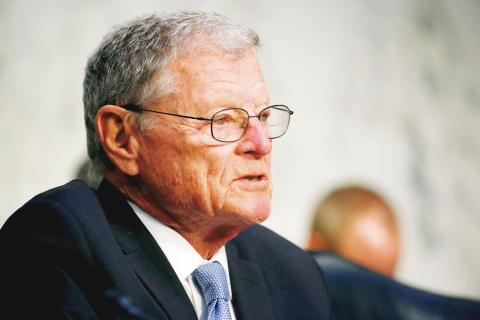Two senior US Republican senators on Monday asked US President Donald Trump’s administration to allow the sale of Lockheed Martin F-35 jets to Taiwan, saying it would help it “remain a democracy” in the face of threats from China.
“These fighters will have a positive impact on Taiwan’s self-defense and would act as a necessary deterrent to China’s aggressive military posture across the Asia-Pacific region,” senators John Cornyn, the assistant majority leader, and James Inhofe, a senior member of the Senate Committee on Armed Services, said in a letter to Trump.
“After years of military modernization, China shows the ability to wage war against Taiwan for the first time since the 1950’s,” they wrote. “However, with your leadership, it is possible to help Taiwan remain a democracy, free to establish a relationship with China that is not driven by military coercion.”

Photo: Reuters
The White House did not immediately respond to a request for comment.
Trump on March 16 signed the Taiwan Travel Act, which encourages the US to send senior officials to Taiwan to meet their Taiwanese counterparts and vice versa.
The Presidential Office in Taipei yesterday reiterated its support for the legislation.
“President Tsai [Ing-wen (蔡英文)] believes that stable relations between Taiwan and the US serve as an important foundation for peace, stability and prosperity in the Indo-Pacific region. Taiwan has the ability and is willing to work with the United States in the Indo-Pacific region to make more contributions,” the office said.
China’s Taiwan Affairs Office Minister Liu Jieyi (劉結一) told Chinese state television late on Monday that “certain Americans” were trying to play the Taiwan card, which harmed the interests of people in China and Taiwan.
“This is duping Taiwan compatriots,” Liu said, without naming any US officials. “It is futile for any outside forces to try and play the Taiwan card and doing anything to harm the interest of the Chinese people.”
The US military has put countering China and Russia at the center of a new national defense strategy unveiled by US Secretary of Defense James Mattis in January.
Other US allies in the Asia-Pacific region, such as Singapore, are also exploring the purchase of F-35s.
Lockheed said it hit its target last year of delivering 66 F-35 jets to the US and its allies.
This article has been corrected since it was first published to indicate that the Taiwan Travel Act is a public law, not a non-binding congressional resolution.

MAKING WAVES: China’s maritime militia could become a nontraditional threat in war, clogging up shipping lanes to prevent US or Japanese intervention, a report said About 1,900 Chinese ships flying flags of convenience and fishing vessels that participated in China’s military exercises around Taiwan last month and in January last year have been listed for monitoring, Coast Guard Administration (CGA) Deputy Director-General Hsieh Ching-chin (謝慶欽) said yesterday. Following amendments to the Commercial Port Act (商港法) and the Law of Ships (船舶法) last month, the CGA can designate possible berthing areas or deny ports of call for vessels suspected of loitering around areas where undersea cables can be accessed, Oceans Affairs Council Minister Kuan Bi-ling (管碧玲) said. The list of suspected ships, originally 300, had risen to about

DAREDEVIL: Honnold said it had always been a dream of his to climb Taipei 101, while a Netflix producer said the skyscraper was ‘a real icon of this country’ US climber Alex Honnold yesterday took on Taiwan’s tallest building, becoming the first person to scale Taipei 101 without a rope, harness or safety net. Hundreds of spectators gathered at the base of the 101-story skyscraper to watch Honnold, 40, embark on his daredevil feat, which was also broadcast live on Netflix. Dressed in a red T-shirt and yellow custom-made climbing shoes, Honnold swiftly moved up the southeast face of the glass and steel building. At one point, he stepped onto a platform midway up to wave down at fans and onlookers who were taking photos. People watching from inside

Japan’s strategic alliance with the US would collapse if Tokyo were to turn away from a conflict in Taiwan, Japanese Prime Minister Sanae Takaichi said yesterday, but distanced herself from previous comments that suggested a possible military response in such an event. Takaichi expressed her latest views on a nationally broadcast TV program late on Monday, where an opposition party leader criticized her for igniting tensions with China with the earlier remarks. Ties between Japan and China have sunk to the worst level in years after Takaichi said in November that a hypothetical Chinese attack on Taiwan could bring about a Japanese

The WHO ignored early COVID-19 warnings from Taiwan, US Deputy Secretary of Health and Human Services Jim O’Neill said on Friday, as part of justification for Washington withdrawing from the global health body. US Secretary of State Marco Rubio on Thursday said that the US was pulling out of the UN agency, as it failed to fulfill its responsibilities during the COVID-19 pandemic. The WHO “ignored early COVID warnings from Taiwan in 2019 by pretending Taiwan did not exist, O’Neill wrote on X on Friday, Taiwan time. “It ignored rigorous science and promoted lockdowns.” The US will “continue international coordination on infectious